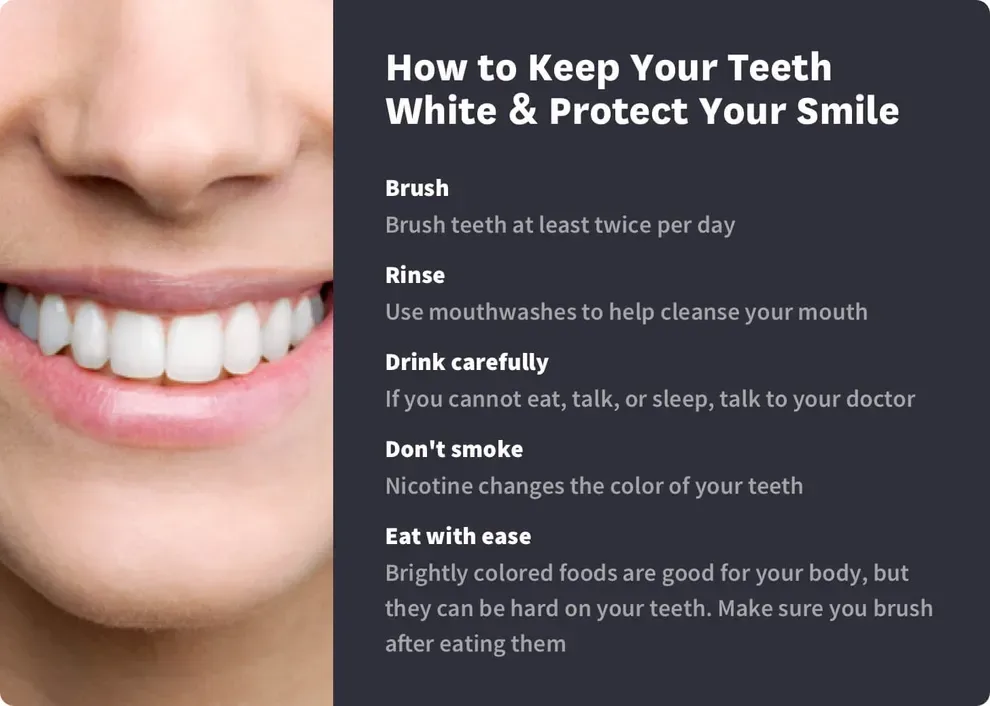How Long Does Teeth Whitening Actually Last?

Table of Contents
- How Teeth Whitening Works
- Teeth Whitening Solutions
- How Long Does Whitening Last?
- How to Protect Your Smile
- References
You've decided to invest in a brighter, whiter smile. How long will your pearly whites gleam?
The persistence of your white smile depends on the product you choose. You can help ensure that your investment is worthwhile by choosing the right foods and caring for your teeth properly when the whitening is complete.
How Tooth Whitening Works
Two main methods are involved in restoring the color of your teeth: abrasion and bleaching. Some products are made for use at home, and others are applied by medical experts in office visits.
Choose an abrasive product, and you'll apply a paste or powder to your teeth and scrape away surface stains. Choose a bleaching product, and a chemical sits on your teeth to remove colors deep inside the tooth.
In general, experts say, stronger products need shorter working timeframes. If you're working with a dentist and using a powerful chemical, you may only need an appointment or two to get the job done.
Tooth whitening isn't benign, as it does involve digging into your teeth. Your dentist may encourage you to avoid lightening your smile if you have:
Sensitive teeth. Strong bleaches can make you even more responsive to things like heat or cold.
Gum disease. Products slathered on your teeth can splash on surrounding tissues. If you already have a health issue, this could cause pain.
Worn teeth. If you grind your jaws together, you could wear away your teeth's outer coverings. Bleaches could take away color at an uneven rate in teeth like this.
If you have healthy teeth ready for whitening, you'll decide how light your teeth should be before you get started. And the samples you choose at that point can help you determine if stains are coming back into your smile.
Teeth Whitening Solutions
Here’s a breakdown of the different types of teeth whitening solutions and their specifics:
| Cost | Ease of Use | How Long Until Results? | How Long Does It Last? | |
|---|---|---|---|---|
| Toothpaste | Less than $20 | Very easy; substitute your toothpaste | Up to 6 weeks | 3 to 4 months |
| Strips | Up to $70 | Easy; wrap around your teeth | A few days | At least 4 months |
| Foam | Included with Byte trays | Easy; fill your [teeth aligners](https://www.byte.com/) with the product | About 2 weeks | About 3 months |
| Pen | Less than $20 | Easy; spread the solution on your teeth | Up to a week | A few days (most people use them daily) |
| Trays From Your Dentist | $600 or more | Difficult; doctor typically prescribes the bleaching solution | Almost immediate | 6 months to 2 years |
| Laser Bleaching From Your Dentist | $1,000 or more | Difficult; must be done at the doctor's office | Immediate | A year or longer |
| In-Office Bleaching | $600 or more | Difficult; must be done at the doctor's office | Immediate | Up to 3 years |
Most teeth whitening treatments last at least a month, but some can last for three years or longer.
How Long Does It Last?
Every mouth is different, and the products you pick can impact the persistence of your smile. But studies suggest that most whitening products last for quite a while.
In one study, researchers found that results lasted for at least a month in people who opted for in-office tooth bleaching. Participants may have experienced even longer results, as the study ended after 30 days. But most still had whiter teeth when the researchers were done with their work.
Experts say professional tooth whitening can last for a few months, or it can last for 3 years. If you're working with an expert, ask how long you can expect to see the changes. And find out if you can come back for touchup treatments if the poor color comes back.
Some consumers opt for at-home products, and they never work with a dental professional on a brighter smile. People like this might use:
Brightening toothpaste. Mild bleaching products embedded within the cleansing agents remove some stains.
Strips. Bleaches embedded within film work on the surface of teeth, and they're tossed away each night.
Pastes. A gel or powder is sprinkled or coated on the teeth to remove stains.
Some over-the-counter products come with guarantees. Flip over the box, and you'll see fine print that details how long results last and what you can do if you're not satisfied with the help.
But some make no promises at all, and they contain very weak agents that can't dig deep into the teeth. You might get no relief from a product like this. If you do, the change might not last for more than a month or so.
How You Can Protect Your Smile

Caring for your teeth is critical at any point in your life, but it's especially vital after whitening. The choices you make can mean the difference between seeing persistent results and watching them fade away again.
Researchers say some bleaching products can make the surface of your teeth rougher. You may not notice it when you run your tongue along your smile, but the tiny cracks and roughness are there. They can trap particles of food and bits of bacteria. That can darken your smile.
After your whitening, take these steps:
Brush. Use a toothbrush to wipe visible surfaces of your teeth. Wipe at least twice per day, but don't brush so hard that you hurt your gums and soft tissues.
Rinse. Use mouthwashes to help cleanse your mouth, especially when you've had a sugary meal or snack.
Drink carefully. Avoid staining fluids like wine, tea, and coffee. Choose water instead.
Don't smoke. Nicotine changes the color of your teeth, and it's not good for your health. Talk to your doctor if you find it's hard to quit.
Eat with ease. Brightly colored foods are good for your body, but they can be hard on your teeth. If you're a fan of foods like blueberries and pomegranates, make sure you brush after eating them.
Talk with your dentist too, and discuss your whitening work. You may get additional tips you can follow to protect your investment.
